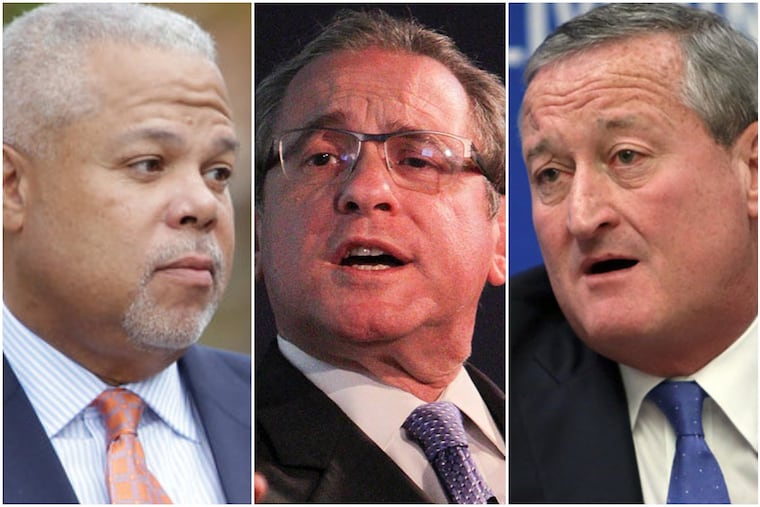Early jousting on polling in Philadelphia’s Democratic primary for mayor | Clout
City commissioner Anthony Clark will have to work for his six-figure salary. For a change.

Can a show of strength signal a secret concern about vulnerability?
Political allies of Mayor Jim Kenney sent Clout a two-page internal polling memo this week showing he has an excellent chance to win a second term this year.
We’re not complaining. We love to pore over polling data. But why now? Is this a political brush-back pitch fired in the direction of State Sen. Anthony H. Williams, who finished second to Kenney in the 2015 Democratic mayoral primary and now appears ready for a rematch?
The poll, paid for by Building a Better Pennsylvania Fund, predicts Kenney winning with 58 percent of the vote in a three-way primary, with Williams taking 16 percent and former City Controller Alan Butkovitz taking 8 percent.
Pollster David Gold of Global Strategy Group said the “remarkable thing” was that Kenney’s numbers stayed steady even after the 500 likely Democratic primary voters polled this month heard four different 30-second simulated attack ads about him.
“It tells a pretty straightforward story that Kenney is in a dominant position,” Gold said.
Williams, who spent nearly $33,000 to test the mayoral field last August and plans to announce next month if he is running, sees Kenney as vulnerable on issues like public safety and taxes. And Williams, who didn’t release his polling, said all local elected officials should be concerned.
“My approach is to listen to the voices that don’t show up in polls, the majority of Philadelphians who are working class or poor, who have challenges in their lives and don’t believe in any of us right now,” Williams said.
Butkovitz, who entered the race in November, countered with his own polling memo this week that found roughly the same outcome if a three-way primary was held today. His poll, also conducted this month, viewed Kenney as vulnerable if a challenger could raise the “substantial resources” needed to attack the mayor’s record for dealing with gentrification, public safety, education, the soda tax, and public corruption.
Butkovitz particularly predicted that talk of “corruption issues” could be all the rage. We asked if he meant the long-running federal probe into Local 98 of the International Brotherhood of Electrical Workers.
“You said that, not me,” he answered.
Building a Better Pennsylvania Fund is an independent expenditure political action committee funded by local building trades unions and closely tied to Local 98′s leader, John “Johnny Doc” Dougherty. The PAC raised $1.8 million in 2015 to support Kenney for mayor.
Deadline day in the 190th District to challenge candidates on the ballot
The field for the special election in West Philly’s 190th state House District is set. For now.
Democratic leaders of the seven wards in the district on Saturday selected Darryl Thomas as their candidate. Two Democrats not selected, Amen Brown and Pastor Pam Williams, collected enough signatures on nomination petitions to get on the March 12 ballot. Michael Harvey is the Republican nominee.
Friday is the deadline to file legal challenges to a candidate’s eligibility. And all eyes appear to be on Thomas, a barber who ran unsuccessfully in the 2016 primary for the 190th District. Thomas lists as his address a Powelton rowhouse he sold nearly four years ago to a woman described by his campaign as his girlfriend.
Records from the Delaware Department of Elections show Thomas was registered to vote in that state from 2001 until 2017 at an address in Bear. Thomas, who is listed on the deed to that property, said it is his mother’s home. He insists he never voted in Delaware. That state’s records list him as doing so in 2002 and 2010.
Philadelphia voting records show Thomas casting ballots in most elections here for more than a decade. Together, the records show Thomas voting in the 2010 general election in Philadelphia and in Delaware, something he also denied.
“We don’t believe he voted in the same election twice,” said William Dunbar, Thomas' campaign manager. “That would be voter fraud.”
The 190th District seat is open because former State Rep. Vanessa Lowery Brown, a Democrat, resigned in December after being convicted on bribery charges. Sonte Reavis, a lawyer, had been considered a front-runner for the Democratic nomination until Clout last week raised questions about whether he lived in the district.
A note on political irony
We are in the last year of Anthony Clark’s third term as a city commissioner. He’s expected to be busy. For a change.
Clark, whose primary duty is to oversee elections in the city, has stirred controversy in the past for not showing up to vote and also rarely showing up at his office.
Clark is retiring, but his colleagues, Chairwoman Lisa Deeley and Vice Chairman Al Schmidt, are expected to run for reelection. Since commissioners aren’t allowed to oversee their own elections, they won’t serve on the Board of Elections this year.
The Common Pleas Court president judge is expected to appoint two judges to serve in their place. They will join Clark, who recently shrugged off questions about his work ethic.
“If a person came past my office and I wasn’t there, I was still at work, always in communication with my office, always made sure everything was signed, all documents in order to promote the election, and that the elections have always run smooth and fair," Clark said.
Clark, who is paid $130,668 as a commissioner, said he plans to travel after leaving office. He’s enrolled in the city’s Deferred Retirement Option Plan, known as DROP, which will pay him a lump sum of $419,301 when his term ends.